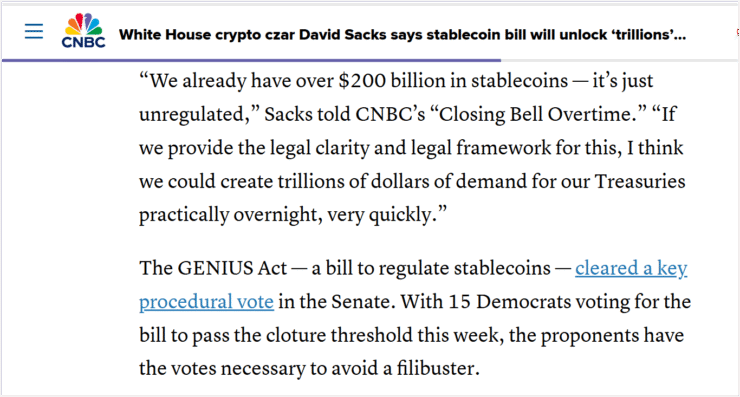David Sacks, President Donald Trump’s top advisor on cryptocurrency and AI, expressed strong confidence this week in the GENIUS Act’s path to full Senate approval. Speaking to CNBC on May 21, Sacks said the legislation is “likely to pass,” pointing to a bipartisan procedural victory in which 15 Democrats joined Republicans to advance the bill past the filibuster stage.
The GENIUS Act—short for Guiding and Establishing National Innovation for U.S. Stablecoins—proposes a federal framework for regulating stablecoin issuers. It mandates 1:1 reserves in liquid assets and introduces transparency, licensing, and compliance standards intended to bring legitimacy to a sector that has long operated in a regulatory gray zone.

Sacks emphasized the bill’s economic potential.
“We already have over $200 billion in stablecoins—it’s just unregulated,” he said.
“If we provide a clear legal framework, we’ll see trillions of dollars in demand for U.S. Treasurys almost immediately.”
His remarks align with the administration’s broader view of stablecoins as strategic financial instruments—capable of reinforcing dollar dominance while attracting new capital into Treasury markets. With momentum building in the Senate, the GENIUS Act now stands poised to reshape how stablecoins interact with U.S. fiscal policy.
Conflict of Interest Claims Cloud Stablecoin Legislation
As the GENIUS Act progresses, questions of conflict of interest have begun to surface, particularly around the Trump administration’s proximity to crypto-linked ventures. Critics highlight World Liberty Financial—a digital asset firm reportedly backed by Trump family members—as a potential beneficiary of the bill’s passage.
The firm recently launched USD1, a U.S. Treasury-backed stablecoin, and has already secured a $2 billion investment commitment from Abu Dhabi’s MGX fund through Binance. Should the GENIUS Act pass, regulatory clarity could substantially increase institutional demand for products like USD1.
David Sacks, who holds a central advisory role in the White House on crypto policy, declined to comment on whether the Trump family has financial interests in USD1. He confirmed, however, that he divested $200 million in crypto-related assets before accepting his role in the administration.
Despite strong bipartisan momentum, the bill isn’t without challenges. A recent amendment by Senator Josh Hawley to cap credit card late fees has drawn criticism from the banking sector, which argues the measure could threaten support from moderate lawmakers who otherwise back stablecoin regulation.
Stablecoins Offering Yield Stir Tension With U.S. Banks
A rising class of yield-bearing stablecoins is unsettling traditional banks, with industry experts warning of a growing power shift in financial markets. Some analysts claim that banks see these products as a threat to their deposit base and business model.
In a May 21 essay titled “The Empire Lobbies Back,” NYU professor and former blockchain strategist Austin Campbell accused banks of waging a lobbying campaign against the GENIUS Act and other stablecoin measures.
“Banks are used to profiting from fractional reserve lending while offering negligible returns to depositors,” Campbell wrote.
“Yield-bearing stablecoins expose the fragility of that system by showing there’s an alternative that’s transparent, on-chain, and potentially more rewarding.”
Backing this view, Pendle Finance released a report showing that interest-paying stablecoins now represent over $11 billion in circulation—roughly 4.5% of the total stablecoin market as of May. This surge reflects growing institutional demand for yield-bearing digital assets amid persistent interest in decentralized finance.
Quick Facts
- David Sacks says the GENIUS Act is “likely to pass,” citing bipartisan Senate support.
- The bill would establish strict rules for stablecoin issuers, including 1:1 reserve mandates.
- Concerns have emerged over Trump-linked firms potentially benefiting from the legislation.
- Yield-bearing stablecoins have reached $11 billion, worrying traditional banks.





